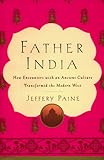Father India
Material type: TextPublication details: HarperCollinsDescription: 324 pagesISBN:
TextPublication details: HarperCollinsDescription: 324 pagesISBN: - 9780060173036
- 954
- DS413
| Item type | Current library | Call number | Copy number | Status | Date due | Barcode | |
|---|---|---|---|---|---|---|---|
 Book
Book
|
Lake Chapala Society | 954 PAIN (Browse shelf(Opens below)) | 1 | Available | 42314 |
This is a 1st edition copy of the book signed by the author. Over the past hundred years, India has held an enormous fascination for western intellectuals and artists. Father India explores the life-changing influence of the subcontinent on western ideas of modernity by narrating the curious, spellbinding stories of a succession of twentieth-century Europeans and Americans. These major culture figures--including Lord Curzon, Annie Besant, E. M. Forster, Carl Jung, William Butler Yeats, V. S. Naiipaul, Christopher Isherwood, and Martin Luther King Jr., among others--acted out their most secret dreams in India. Troubled by a vague but persistent discontent, most of the characters portrayed in this book journeyed to India seeking a perspective on their own culture from outside it. The Swiss psychoanalyst Carl Jung, for example, unable to find within western intellectual tradition an antidote to fascism, scoured India for a different way to integrate an understanding of evil into the human psyche. Martin Luther King Jr. tried to discover a new basis for American politics, incongruously, in India. And V. S. Naipaul came to search for family roots but ended up inadvertently placing the Enlightenment values of individuality, rationality, and progress in a living crucible there. Gandhi's answer to the question "Why now?" as he observed one westerner after another come to his own ashram, is telling: The contemporary West had misplaced its soul, and pilgrims to India were on a mission to retrieve it. In the process, their unconscious assumptions about politics, religion, and identity in their own cultures were turned upside-down and laid open to question. "What do you think of western civilization?" Gandhi was once asked. He answered, "It would be a good idea." This book is about a good idea in India, Father India tells the story of those people--Curzon, Besant, Forster, Naipaul, Isherwood, Mirra Richard, and oddly, Gandhi, too, as well as a chorus of minor characters--who attempted to comprehend or even to protect western civilization through India, and of how their successes and failures returned to the modern West a changed understanding of itself.
There are no comments on this title.
